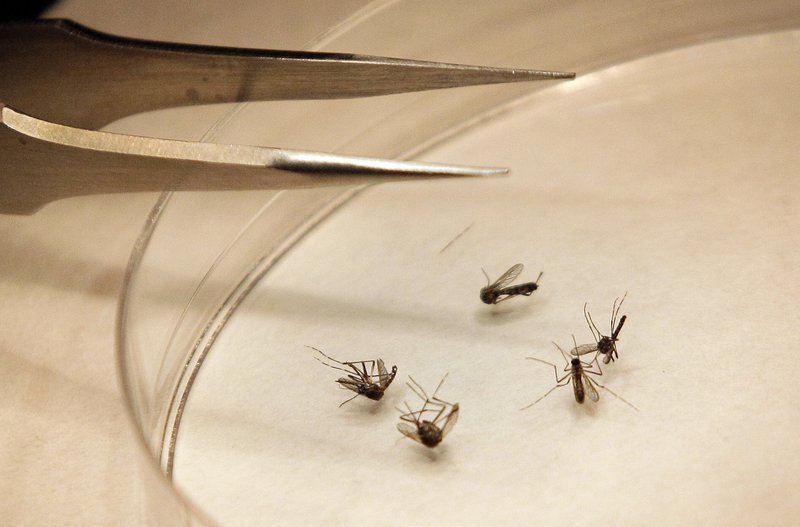GORHAM — Less than a week after West Nile virus was first detected in Maine, a second mosquito population has been found to be infected, in Gorham.
“We are not surprised,” said Dr. Stephen Sears, Maine’s state epidemiologist. “We expect we’ll see more.”
This year’s first detection of West Nile virus came from a regular surveillance pool in York County and was confirmed late last week. The most recent case indicates the presence of the virus in Cumberland County.
The finding came from among 25 to 30 monitoring sites, where another mosquito-borne disease, eastern equine encephalitis, has been found more widely in the past.
Most of the sites are in central Maine, and some are as far north as Aroostook County.
Maine has never had a confirmed case of a human contracting the virus, health officials said. The state Center for Disease Control and Prevention is awaiting test results from a federal laboratory on two suspected cases in Maine — a possible case of West Nile that officials say would most likely have been contracted out of state, and one potential case of EEE.
“I don’t want people to be alarmed,” Sears said. Most people will never be bitten by an infected mosquito, and most who are will never feel sick, he said. West Nile virus often causes no perceptible symptoms.
People who were outdoors in Gorham on Thursday afternoon said they hadn’t heard that mosquitoes in town were infected with the virus.
“Yikes,” said Robyn Flint, a custodian for the Gorham School Department who was weeding outside the Narragansett School. “I guess we should wear more insect spray.”
Flint’s co-worker Diane Mercier said she doesn’t go outdoors at night, to avoid mosquitoes. But, she said, “I have a pony. I’m worried about that.”
Mercier said she has been thinking about getting a vaccination for her pony, Lily, who lives at her house in Gorham.
While horses can get vaccinated against West Nile virus, there is no vaccination for humans.
Judy Piawlock, who was at the Narragansett School playground with her two granddaughters, said she would have to learn more about the implications of the discovery in Gorham before taking any action.
“It does concern me a little,” she said.
Henry Wickham said he had been following the reports of West Nile virus in Massachusetts. If it’s in Maine now, he said, he might take care to put on bug spray before walking his wife’s dog through the woods in Gorham, as he did Thursday.
Greg Day said he uses insect repellent when he walks through the woods but didn’t feel the need to put it on Thursday when he and his 12-year-old daughter, Kylie Lagasse, went to hit golf balls in a field behind Village Elementary School.
“It’s a little concerning, but I’m not going to push the panic button,” he said.
With a forecast for a sunny weekend and temperatures in the 70s and low 80s, conditions are ideal for people to be outdoors, so state officials are advising reasonable measures for limiting exposure to mosquitoes.
Sears emphasized “good mosquito prevention,” including staying indoors from dusk to dawn, wearing long-sleeved shirts and pants, and using insect repellent.
And, he said, don’t be afraid. The focus has centered on West Nile virus, which can be fatal in rare instances, because “there’s a lot of (the virus) in the country now,” he said. But it isn’t a common threat to human health.
Both West Nile virus and EEE strike birds, horses and other mammals. The viruses have “been around for a while,” Sears said.
In 2010, West Nile virus was reported in Maine, and in past years, EEE has been found here, usually in central and southern Maine in late summer.
West Nile virus has been widespread in mosquitoes in New Hampshire, which reported its first case in a human Thursday. In Massachusetts, it has hit both horses and humans.
Still, there’s a much higher incidence of tick-borne disease, Sears said. “There’s certainly a whole lot more Lyme disease.”
As of the first week of August, 38 cases of anaplasmosis — a bacterial infection from deer ticks — had been reported to the Maine CDC, from eight counties: Androscoggin, Cumberland, Hancock, Kennebec, Knox, Lincoln, Somerset and York.
During all of 2011, a total of 26 cases were reported.
Staff Writer North Cairn can be reached at 791-6325 or at:
ncairn@mainetoday.com
Staff Writer Leslie Bridgers can be reached at 791-6364 or at:
lbridgers@mainetoday.com
Send questions/comments to the editors.





Comments are no longer available on this story